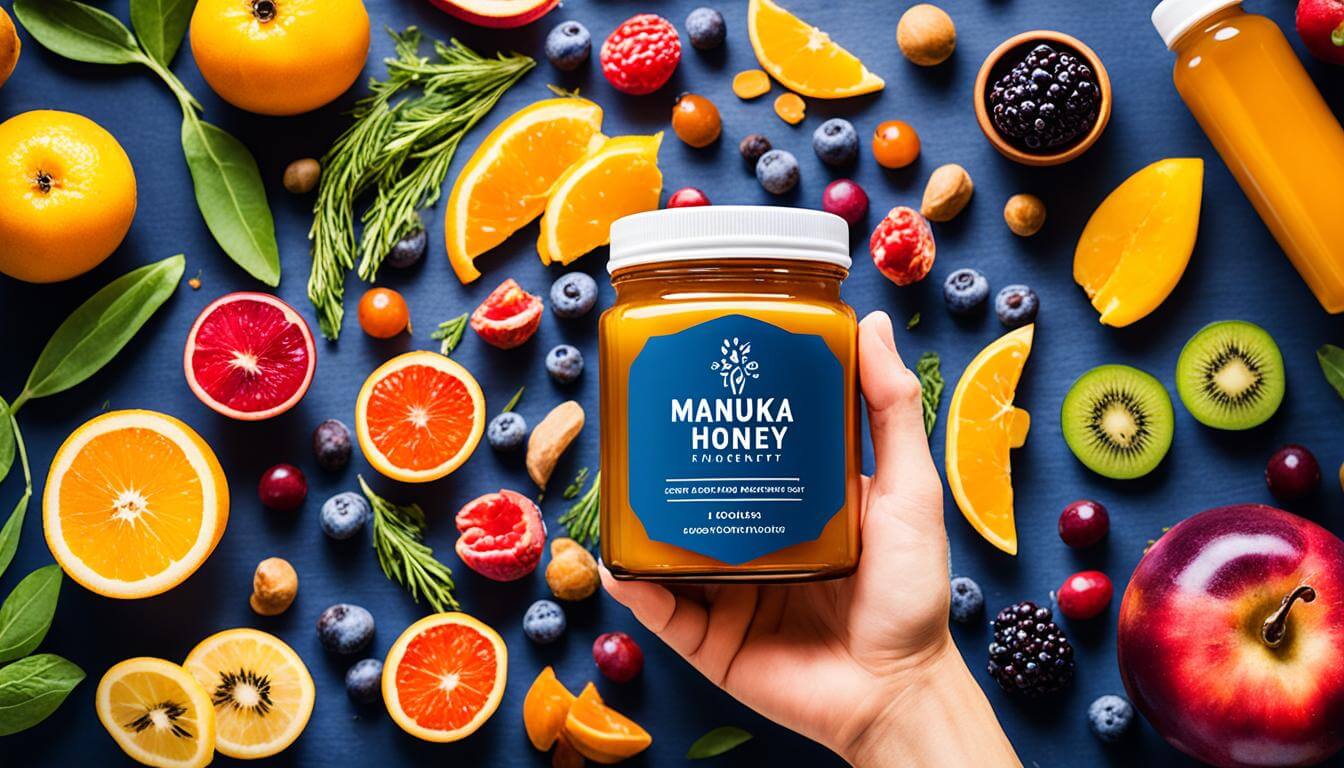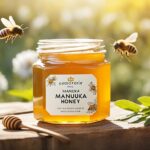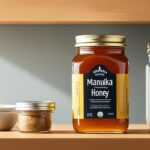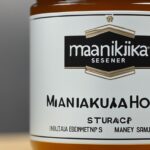At first glance, Manuka honey might just seem like a sweet treat for your tea or toast. Yet, beneath its sticky surface lies a trove of natural antioxidants that could redefine how we look at bees’ liquid gold. The health benefits of Manuka honey have not just fascinated health enthusiasts but have also captured the scientific community’s attention. Prized for its health impact, Manuka honey’s unique composition goes beyond ordinary sweetness, reaching into the realms of potentially transformative wellness impacts. Sourced from the nectar of the New Zealand Manuka bush, this honey isn’t merely a delicacy—it’s a reservoir of health-promoting treasures waiting to be explored.
What sets Manuka honey apart are the compounds it contains, like methylglyoxal (MGO), that have catapulted it into the limelight as a powerful health-enhancing agent. Rightfully earning its place in the pantheon of natural antioxidants, Manuka honey beckons with a promise of purity and potency that could tilt the scales of health in your favor. Now, it’s time we dive into the sticky subject of why Manuka honey’s antioxidants are not just beneficial but exceptionally vital for our well-being.
Introduction to Manuka Honey and Its Unique Properties
Discovering the essence of Manuka honey requires understanding the unique Manuka factor (UMF), a quality trademark that distinguishes this rare honey from all others. Distinguished by its origins in New Zealand, Manuka honey is much more than a sweetener; its signature compounds provide health-enhancing benefits that have attracted global attention.
The cornerstone of Manuka honey’s remarkable potency is MGO in Manuka honey, also known as methylglyoxal. This compound’s concentration is far superior to that found in traditional honey, conferring it with powerful antibacterial properties. But the benefits don’t stop there. Raw Manuka honey benefits also include support for digestive and skin health, making it a multi-faceted addition to your wellness regimen.
To ensure consumers are getting authentic and high-grade Manuka honey, the UMF quality mark comes into play. Let’s break down what these ratings mean and why they matter:
| UMF Rating | Antibacterial Strength | MGO Content |
|---|---|---|
| UMF 5+ | Basic level | Low |
| UMF 10+ | Medium level | Moderate |
| UMF 15+ | Strong | High |
| UMF 20+ | Superior high grade | Very high |
Therefore, when selecting Manuka honey, reaching for jars with a higher UMF rating means stronger antibacterial effectiveness and a higher concentration of the key elements like MGO that make Manuka honey a unique wellness booster.
Remember, genuine Manuka honey comes with both a UMF rating and a license number from the Unique Manuka Factor Honey Association (UMFHA), assuring you of its purity and origin. So before indulging in the richness of Manuka honey, verify these markers for a true taste of its raw, unadulterated benefits.
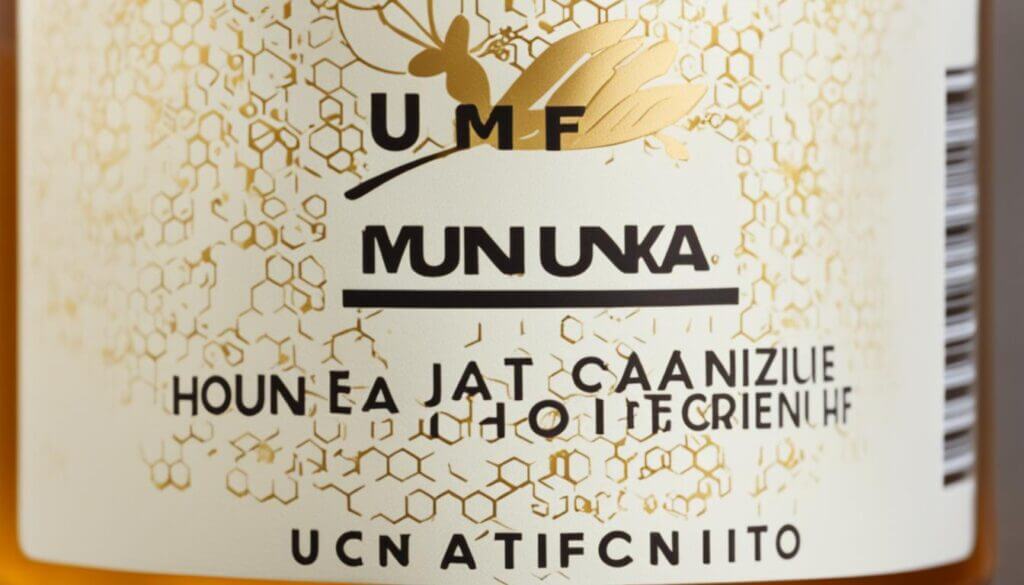
As the world leans into more natural and health-centric products, Manuka honey stands out, offering this unique trilogy – taste, authenticity, and wellness – all encapsulated in one golden elixir.
The Science Behind Manuka Honey Antioxidants
The intricate interplay between the antioxidant properties of Manuka honey and overall health is a focus of intense scientific inquiry. Highly regarded for its bioactive compounds, Manuka honey contains hydrogen peroxide, dihydroxyacetone, and particularly MGO (methylglyoxal), which contribute to its robust antioxidant capacity. These components harmonize to neutralize deleterious free radicals, offering a potential bulwark against cellular oxidative stress, a mechanism linked to a plethora of health conditions.
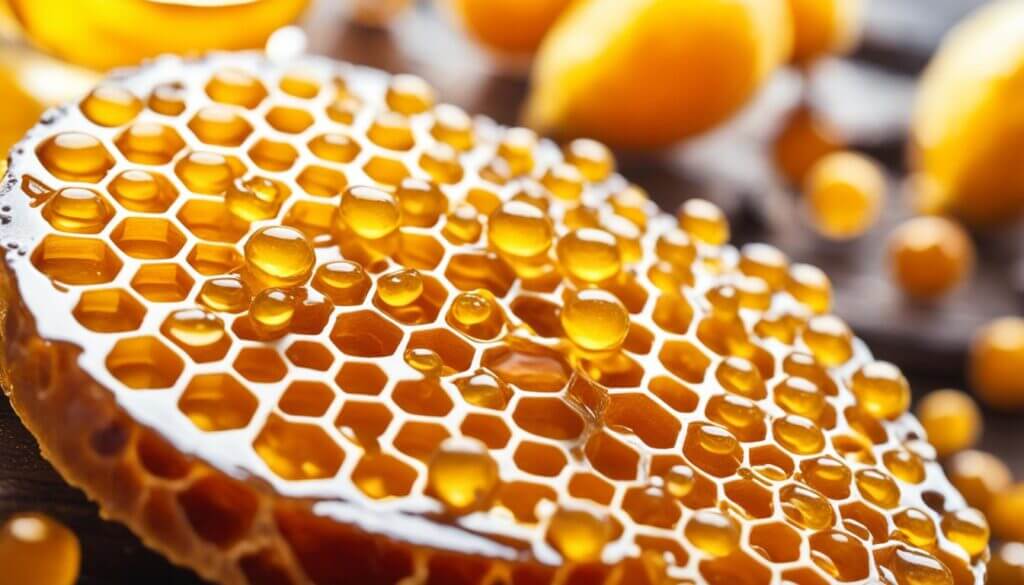
Scientific studies meticulously examining the effects of MGO in Manuka honey have shed light on its ability to fortify the body’s antioxidant defenses. We probe into the depths of published research to substantiate the claims associated with these benefits.
- In-vitro studies: Evaluations of Manuka honey in controlled lab settings have observed its antioxidant capacity, notably attributing this action to the presence of MGO and other bioactive compounds.
- In vivo research: Animal models have provided insights into how Manuka honey’s antioxidants might translate to health impacts within living organisms, showing promising results in reducing oxidative markers.
- Clinical trials: Although more research is needed, some clinical studies suggest potential improvements in antioxidant biomarkers in humans following consumption of Manuka honey.
Through these research avenues, the scientific community seeks to unravel the complexities of how Manuka honey’s natural constituents contribute to its acclaimed therapeutic potential. The dialogue between ongoing MGO scientific studies and the observed health benefits enriches our understanding of this natural elixir’s capabilities.
Navigating the Health Benefits of Antioxidants
The journey to optimal health often leads to the discovery of nature’s powerful compounds, among which antioxidants stand at the forefront. The benefits of antioxidants are extensive and essential for the promotion of a balanced, healthy lifestyle. By engaging in oxidative stress prevention and free radical scavenging, these compounds support our bodies fundamentally and holistically.
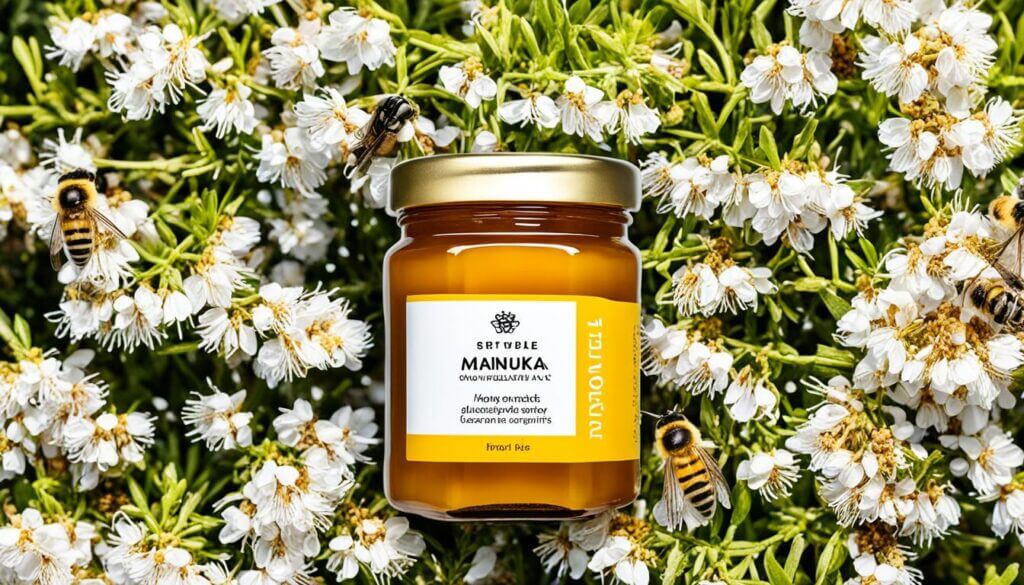
Antioxidants from natural sources, such as the acclaimed Manuka honey, offer a variety of health-promoting attributes. By incorporating antioxidant-rich foods into our daily regimen, we set the stage for disease prevention, improved aging processes, and reinforced heart health. Below is a deeper look into the ways antioxidants contribute to our wellness:
- Disease Prevention: Antioxidants neutralize free radicals that can lead to cellular damage and the onset of chronic diseases.
- Anti-Aging Benefits: By protecting the skin and body from oxidative stress, antioxidants can slow down the aging process.
- Heart Health: Certain antioxidants have been linked to reduced cholesterol levels and improved blood vessel function.
Furthermore, the advantages of antioxidants can be quantified to highlight their impact on our well-being:
| Antioxidant Benefit | Effect on Body | Example Source |
|---|---|---|
| Cellular Protection | Reduces risk of mutations and cellular damage. | Manuka honey |
| Reduced Inflammation | Low inflammation levels are associated with a lower risk of chronic diseases. | Green Leafy Vegetables |
| Lifespan Extension | Potential to increase longevity by reducing oxidative damage over time. | Berries |
Antioxidants are more than just a health trend; they are a critical component of our body’s defense system, and incorporating them into our daily diet, especially from sources as beneficial as Manuka honey, is a step towards a more vibrant, healthier life.
Exploring the Impact of Manuka Honey Antioxidants on Immunity
As a natural elixir, Manuka honey has long been celebrated for its health-boosting benefits. Among its most praised attributes are its abilities in Manuka honey immune support and acting as a natural shield against bacterial infections. The inclusion of antibacterial Manuka honey in health regimens has been suggested to play a pivotal role in boosting immunity with Manuka honey. This section will delve into how Manuka honey’s antioxidants contribute to immune defense and examine current research on its efficacy.

Manuka honey’s immunomodulatory properties can be attributed largely to its high antioxidant content. These antioxidants help neutralize free radicals, which, if left unchecked, can cause oxidative stress and harm the body’s cells, including those of the immune system. Now, let’s look at how these antioxidants work in tandem with other bioactive components to bolster the immune system.
| Antioxidant Compound | Immune-Supporting Action | Notable Research Findings |
|---|---|---|
| Methylglyoxal (MGO) | Direct antibacterial action | Studies have observed MGO to effectively combat various strains of bacteria, including some that cause respiratory infections. |
| Hydrogen Peroxide | Antiseptic properties | Hydrogen peroxide in Manuka honey helps to cleanse wounds and prevent bacterial infections, contributing to tissue repair and immune function. |
| Phenolic Compounds | Enhancing antioxidant defense mechanisms | Research links high phenolic content in Manuka honey to increased antioxidant activity in the body. |
The synergistic effect of these compounds not only aids in targeting pathogens but also supports the immune response during recovery and healing periods. It’s key to note that while promising, further detailed research is required to fully understand the scope of Manuka honey’s impact on the immune system. Nonetheless, Manuka honey continues to be a valuable addition to immunity-focused diets.
- By including Manuka honey as a part of a balanced diet, you might enhance your body’s ability to fend off common illnesses.
- Implementing Manuka honey into wellness routines, especially during season changes when the immune system is particularly vulnerable, could offer an additional protective layer.
- Manuka honey can serve as a soothing agent for sore throats, potentially reducing inflammation and fighting bacteria.
Whether it is enjoying Manuka honey in its raw form or as part of various recipes, the potential immune support it offers makes it a sweet ally in the pursuit of health and well-being.
Manuka Honey and Its Anti-Inflammatory Effects
Chronic inflammation can be a harbinger for a multitude of health challenges, affecting overall wellness and quality of life. Fortunately, nature has bestowed us with remedies that can soothe and mitigate such conditions, and Manuka honey is a shining example. Renowned for its natural anti-inflammatory properties, Manuka honey is not merely a sweet treat but also a potential ally in the fight against chronic inflammation.
Research has shed light on the mechanisms that vouch for the anti-inflammatory properties of Manuka honey. Its powerful biochemical constituents, like methylglyoxal and phenolic compounds, are thought to work synergistically to reduce inflammation. This has profound implications, especially for those suffering from inflammatory-related diseases, looking for a natural approach to manage their symptoms.
Let’s examine some of the conditions where the anti-inflammatory prowess of Manuka honey can be particularly beneficial:
- Sore Throat: Manuka honey has been traditionally used to ease throat irritation, leveraging its soothing properties.
- Gastrointestinal Inflammation: Its anti-inflammatory action could be advantageous for individuals experiencing gastrointestinal discomfort.
- Skin Inflammation: External application of this honey has been known to calm inflamed skin conditions, promoting healing.
When considering the therapeutic uses of Manuka honey, it’s essential to look at concrete examples that outline its effectiveness:
| Condition | Beneficial Effect | Study Findings |
|---|---|---|
| Sore Throat Relief | Reduces Throat Inflammation | Studies indicate Manuka honey to be an effective demulcent, providing a protective film and reducing irritation. |
| Gastrointestinal Support | Alleviates Inflammatory Symptoms | Research suggests that the prebiotic effect of Manuka honey can positively influence gut flora, promoting a reduction in gastrointestinal inflammation. |
| Skincare Application | Improves Skin Appearance | Clinical trials show that the anti-inflammatory and antimicrobial properties of Manuka honey can aid in treating minor wounds and skin conditions. |
In conclusion, Manuka honey emerges as a resourceful natural anti-inflammatory agent that can be incorporated into various aspects of a healthy lifestyle. Whether used internally or applied externally, the benefits of this honey are not only rooted in tradition but are also backed by scientific research. As we consider the wide-ranging impacts of chronic inflammation, Manuka honey’s place in preventive health and natural wellness seems increasingly significant.
Digestive Health and Manuka Honey Antioxidants
Incorporating Manuka honey for digestion could offer more than just a sweetener for your tea—it’s carving a niche as a natural remedy within the gastrointestinal sphere. Renowned for its therapeutic characteristics, Manuka honey’s high antibacterial properties are attributed to its higher Methylglyoxal (MGO) content. This distinctive component positions Manuka honey as a potential ally against digestive discomforts, promoting not only the soothing of the stomach but also overall digestive health.
People who incorporate Manuka honey into their diets may notice gastrointestinal benefits due to its reputed ability to combat harmful bacteria that can disrupt the gut microbiome. This antibacterial action is vital for maintaining a balanced digestive environment, which can foster nutrient absorption and reduce symptoms of gastro-related ailments.
Below are some of the reported benefits of Manuka honey when used for digestive health:
- Alleviating acid reflux and reducing esophageal inflammation
- Providing relief from the symptoms of gastritis by coating the stomach lining and reducing irritation
- Reducing bloating and uncomfortable gastrointestinal gas through its potential prebiotic effects
It’s suggested that the soothing effects stem from Manuka honey’s rich antioxidant profile, which may help in reducing oxidative stress and inflammation within the digestive tract. However, it’s important to consider that these benefits can vary from person to person, and seeking medical advice before using honey as a remedy for digestive issues is always recommended.
While the appetite for using Manuka honey as a digestive aid grows, ongoing research aims to shed light on the extent of its soothing stomach capabilities and its role in a healthy diet. Anecdotal evidence combined with scientific studies continue to explore Manuka honey’s place in supporting a well-functioning digestive system.
To effectively integrate Manuka honey into your digestive wellness routine, consider the following suggestions:
- Choose genuine Manuka honey with a UMF (Unique Manuka Factor) rating that certifies its quality and potency.
- Start with a small daily dose, such as one teaspoon on an empty stomach, to observe how your body responds.
- For addressing specific digestive symptoms, it may be beneficial to take Manuka honey directly before or after a meal.
While the research is promising, it’s important to note that Manuka honey should complement a balanced diet and that any persistent digestive issues should be evaluated by a healthcare professional.
Skin Health: Manuka Honey’s External Benefits
Manuka honey for skin is gaining attention not only for its internal health benefits but also for its prowess as a natural skincare ingredient. With Manuka honey’s hydrating and antimicrobial properties, it plays a significant role in treating skin conditions with Manuka honey and maintaining a healthy complexion. Its wound-healing capabilities have also not gone unnoticed, making it a trusted natural remedy for cuts, burns, and a variety of other skin concerns.
- Hydrating Effects: Manuka honey’s natural humectant properties draw moisture into the skin, ensuring a well-hydrated and supple feel.
- Antimicrobial Properties: The bioactive compounds found in Manuka honey make it effective in warding off bacteria, reducing the risk of acne and other skin infections.
- Wound Healing: Thanks to its soothing properties, Manuka honey has been utilized in wound care, helping to repair minor cuts and burns with ease.
- Healthy Complexion: Regular use of natural skincare with Manuka honey can lead to a more radiant, glowing skin tone, as it gently exfoliates and nourishes the skin’s surface.
For those interested in incorporating Manuka honey into their beauty regime, the following table captures some common skin conditions and how Manuka honey can be applied for treatment and enhancement of skin health.
| Skin Condition | Benefits of Manuka Honey | Application Tips |
|---|---|---|
| Dry Skin | Intense hydration and moisture retention | Apply a thin layer as a face mask, let sit for 15-20 minutes, rinse with warm water |
| Acne | Natural antibacterial and anti-inflammatory action | Spot treat areas with a dab of Manuka honey, or use as a face cleanser |
| Minor Wounds | Supports skin’s natural healing processes | Apply directly to the affected area, cover with a clean dressing |
| Eczema | Soothes inflammation and irritation | Mix with colloidal oatmeal for a therapeutic face or body mask |
With its multifunctional uses, Manuka honey is an invaluable addition to any natural skincare routine, addressing a wide range of skin health concerns. Whether used as a face mask, spot treatment, or a daily cleanser, treating skin conditions with Manuka honey has never been more beneficial for those seeking a holistic approach to beauty and wellness.
Guidelines for Consuming Manuka Honey for Maximum Health Benefits
Manuka honey is not only a delectable treat but also a robust addition to a health-conscious lifestyle. To truly harness the health benefits of Manuka honey, it is essential to understand how to use Manuka honey effectively. The following recommendations are designed to assist you in optimizing Manuka honey health benefits while respecting Manuka honey intake recommendations.
- Begin with a small dose to ensure that you do not have an allergic reaction, particularly if you have never consumed honey or bee products before.
- Gradually increase your intake to the recommended dosage of one to two tablespoons per day.
- To amplify the antioxidant benefits, consume Manuka honey on an empty stomach.
- Consider adding Manuka honey to warm (not hot) tea or water as heat can diminish its therapeutic properties.
- Be mindful of its interaction with other medications, always consult with a healthcare provider for personalized advice.
Manuka honey can be a versatile ingredient in your pantry. Here’s a concise table highlighting ways to integrate it into your diet:
| Meal | Method | Benefit |
|---|---|---|
| Breakfast | Spread on whole-grain toast or add to yogurt. | Provides a healthy start to your day with an energy boost and supports digestion. |
| Lunch | Drizzle over salads or mix into dressings. | Adds a touch of sweetness and enhances lunchtime meals with its immune-boosting properties. |
| Snack | Blend into a smoothie or pair with apple slices. | Acts as an antibacterial and a healthy pick-me-up during the afternoon slump. |
| Dinner | Glaze for meats or incorporate into sauces. | Contributes to a delicious and comforting end to the day while aiding nighttime recovery and repair. |
Keep in mind that while Manuka honey offers myriad health benefits, it’s still high in sugars, and should, therefore, be consumed in moderation as part of a balanced diet. By following these guidelines, you are set to make the most out of every spoonful of Manuka honey’s natural goodness.
Conclusion
As we reach the end of our exploration into Manuka honey, it is evident that this natural treasure is not just a sweet delight but also a powerful ally for our health. The summary of Manuka honey health benefits has unveiled that the high concentration of natural antioxidants in Manuka honey offers a multitude of health-promoting properties. From bolstering the immune system to providing anti-inflammatory aid and contributing to skin and digestive health, Manuka honey stands as a robust supplement with far-reaching impacts.
However, to truly harness these benefits, it is imperative to ensure the Manuka honey we choose is of the highest quality and authenticity. Accurate labeling, including the UMF rating, can guide consumers to products that deliver the health-enhancing properties discussed. Our final thoughts on Manuka honey antioxidants underscore the idea that selecting the right Manuka honey is paramount. Not just any honey off the shelf qualifies; diligent selection is key.
Manuka honey embodies the quintessence of nature’s prowess in nurturing human health. As a multifaceted adjunct to a well-rounded health regimen, it invites us to embrace a holistic approach to our well-being. With its unique gifts, Manuka honey asks of us a simple commitment: pay attention to the purity and origin of our choice, so we can fully benefit from its potent health properties.
